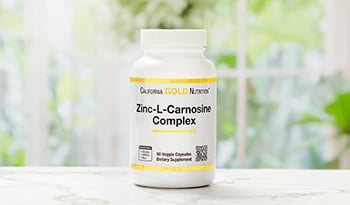Acetyl-L-karnitin: Essensielt for vedlikehold, beskyttelse og reparasjon

Acetyl-L-karnitin (ALC eller ALCAR) har blitt studert som en ny behandling for depresjon, kognitiv svikt, Alzheimers sykdom, ADHD (Attention Deficit Hyperactivity Disorder), støyindusert hørselstap, overdose av acetaminophen (f.eks. Tylenol), hepatisk encefalopati og andre tilstander.
Acetyl-L-karnitin; et lite molekyl med en stor jobb
L-karnitin er en aminosyre som hovedsakelig finnes i kjøtt og melkeprodukter. Når L-karnitin er inntatt, kan det omdannes til acetyl-l-karnitin (ALCAR), som transporteres til alle deler av kroppen og lett krysser blod-hjerne-barrieren for å utføre viktige cellulære oppgaver. ALCAR er for eksempel nødvendig for cellemembranfunksjoner, nevrotransmisjon, metabolisme av essensielle fettsyrer, energimetabolisme og antioksidantbeskyttelse ( Pettegrew et al., 2000). Prekliniske studier tyder på at ALCAR kan øke nevroplastisiteten (nevronenes evne til å skape nye forbindelser) og nevrogenesen (veksten av nye hjerneceller) i hippocampus (der emosjonelle minner lagres) og prefrontal cortex (tenkning på høyere nivå og modulering av emosjonelle reaksjoner) (Wang og Pae 2017).
ALCAR er trygt, men har noen få bivirkninger
Selv om ALCAR generelt sett ALCAR er tryggere og har færre bivirkninger enn reseptbelagte antidepressiva og legemidler som brukes til å behandle kognitiv svikt, har det noen ulemper. Den første er at ALCAR er treg til å virke. Det kan ta to til fire måneder før man ser effekten av behandlingen. Det andre er at de fleste pasienter må ta mange piller, i gjennomsnitt tre 500 mg tabletter en eller to ganger om dagen. Den tredje er at ALCAR kan ha følgende bivirkninger: diaré, illeluktende urin, forstoppelse, kvalme og dyspepsi (fordøyelsesbesvær eller magesmerter). Mindre vanlige bivirkninger inkluderer søvnløshet, uro og økt appetitt.
ALCAR for depresjon og depresjon; avhenger av hvilken type depresjon
Selv om det er utført 10 dobbeltblinde, randomiserte, placebokontrollerte (DBRPC) studier av ALCAR mot depresjon, var de som viste signifikante fordeler, hovedsakelig hos eldre pasienter, pasienter med dystymi (kronisk mild til moderat depresjon) og pasienter med medisinske tilstander som fibromyalgi eller kreft (Wang et al. 2014). Mange av de eldre studiene brukte utdaterte metoder som ikke ville blitt ansett som høy kvalitet etter dagens standarder.
ALCAR er likevel nyttig for mange pasienter med depresjon. Dette kan tilskrives de generelle positive effektene på cellefunksjoner, energimetabolisme og nevrotransmisjon. Eldre pasienter kan dessuten ha en tilstand som kalles vaskulær depresjon, det vil si depresjon relatert til en reduksjon i blodtilførselen til områder i hjernen som er involvert i humør eller stemningsrelaterte funksjoner. I slike tilfeller kan bedre blodtilførsel eller perfusjon av hjernen forbedre humør, orienteringsevne, kognitive funksjoner, hukommelse og atferd.
Selv om ALCAR ikke er en førstevalgsbehandling for alvorlig depresjon, bør det tas i betraktning for pasienter med dystymi, mulig cerebrovaskulær insuffisiens, fibromyalgi eller manglende evne til å tolerere reseptbelagte antidepressive medisiner.
Hva gjør ALCAR mot kognitiv svikt og demens?
Siden 1980& rsquo; s forskning har utforsket bruken av ALCAR til behandling av nevrodegenerative sykdommer, inkludert aldersrelatert kognitiv svikt, mild kognitiv svikt, vaskulær demens og Alzheimers sykdom. Ut fra disse studiene er det mulig å identifisere hvilke typer personer som kan ha større sannsynlighet for å respondere på ALCAR.
Studier av kognitiv svikt og demens viste at ALCAR var mest effektivt hos pasienter der cerebrovaskulær svikt bidro til nedgangen i mentale evner. Når vi blir eldre, har sirkulasjonen gjennom de minste kapillærene en tendens til å avta, noe som fører til at hjernecellene ikke får nok oksygen og næringsstoffer. Etter hvert som cellene blir svakere, blir de mer sårbare for skade eller apoptose (celledød) ved selv små reduksjoner i perfusjonen, noe som kan oppstå hvis personen blir dehydrert eller overopphetet, gjennomgår en operasjon, får blodtrykksfall, driver med overdreven fysisk aktivitet, har ubehandlet søvnapné eller opplever et traumatisk sjokk.
Tegn på mulig cerebrovaskulær insuffisiens
Svimmelhet, ørhet, forbigående forvirring, problemer med å snakke eller huske, mental treghet, problemer med eksekutive funksjoner (planlegging, organisering og å få ting gjort), plutselig svakhet eller fall kan være tegn på vaskulær insuffisiens. Cerebrovaskulær insuffisiens kan også være forbundet med endringer i atferd, som apati (tap av interesse), angst eller depresjon. Tilstedeværelsen av diabetes, aterosklerose og hjertesykdom er ytterligere risikofaktorer.
Det er så vanlig å finne tegn på diffus vaskulær insuffisiens på hjerneskanningen hos en eldre pasient at det ofte leses som "normalt for alderen", og derfor sier helsepersonell ofte til slike pasienter at skanningen var "normal", men når dette funnet forekommer hos en pasient som har symptomer som kan være forbundet med vaskulær insuffisiens, bør situasjonen og hjerneskanningen revurderes. Når nevronene sliter med å overleve, er det fornuftig å gi dem bedre tilgang på oksygen og viktige næringsstoffer for å forhindre ytterligere tap og, i noen tilfeller, for å hjelpe cellene til å komme seg. Litt mer antioksidantbeskyttelse kan også hjelpe. ALCAR, nootropika, cerebrovasodilatorer (forbindelser som hjelper blodårene til å åpne seg), næringsstoffer og adaptogene urter kan forbedre mitokondrienes funksjon, styrke cellenes forsvar og øke restitusjonen.
Vaskulær sykdom hos pasienter med demensdiagnose
Bare ca. 10 % eller færre av demenspasientene har ren vaskulær demens. Likevel har 75 % av pasientene med demens tegn på vaskulær sykdom. Når en pasient får diagnosen demens eller Alzheimers sykdom, er det altfor ofte at den nevrologiske utredningen og behandlingsforsøkene stopper opp. Slike pasienter er imidlertid ofte eldre og har derfor sannsynligvis en viss grad av vaskulær insuffisiens, noe som kan være synlig på hjerneskanning. Behandling av vaskulær insuffisiens med ALCAR og andre hjerneforbedrende midler er verdt å prøve, selv om den primære diagnosen er demens, fordi bare en delvis forbedring kan utgjøre en stor forskjell i livskvaliteten for pasienten, familien og omsorgspersonene.
ALCAR har en plass i behandlingen av vaskulær kognitiv svikt (VCI), noe som ble påvist i en nylig gjennomført DBRPCT (Young et al. 2018). I denne studien fikk 56 pasienter med vaskulær kognitiv svikt, som allerede brukte donepezil (Aricept), enten 1500 mg ALC per dag eller placebo i 28 uker. I gruppen som fikk ALCAR, ble skårene på Montreal Cognitive Assessment betydelig forbedret sammenlignet med placebogruppen. Resultatene på andre tester av hjernefunksjon var imidlertid ikke forskjellige. De største forbedringene med ALCAR skjedde innen oppmerksomhet og språkfunksjoner.
ALCAR fungerer bedre i kombinasjon med andre kosttilskudd
Levende organismer er så komplekse at det ikke burde overraske oss å oppdage at aldrende celler klarer seg bedre når de får tilført flere næringsstoffer for å styrke det intrikate cellulære maskineriet. En lovende vitamin- og næringsmiddelformel, kalt "NF", forbedret kognitive symptomer og andre hjernefunksjoner. NF inneholder folsyre , B12 , vitamin E , S-adenosylmetionin, N-acetylcystein og acetyl-L-karnitin . Acetyl-L-karnitin . I studier av pasienter med Alzheimers sykdom i tidlig, middels og sen fase oppnådde de som fikk NF, signifikant bedre resultater på nevropsykiatriske målinger, inkludert hukommelses- og kognitive tester (Chan et al. 2008; Remington et al. 2009, 2015). Pasientene i disse studiene tolererte formelen godt. Ingen alvorlige bivirkninger ble rapportert. Det trengs flere studier for å bekrefte disse oppløftende funnene. Hver komponent i denne formelen har sine egne helsefordeler og har få bivirkninger. For personer med cerebrovaskulær vaskulær insuffisiens kan en cerebrovasodilatator, for eksempel Picamilon, gi ekstra perfusjon.
ALCAR mot støyindusert hørselstap
På samme måte som overdreven soleksponering kan forårsake oksidativ skade på øyets linse og netthinne, kan overdreven støyeksponering forårsake oksidativ skade på det indre øret, noe som bidrar til hørselstap. Studier har vist at visse kombinasjoner av antioksidanter kan beskytte mot varige skader som følge av støyeksponering (Choi og Choi 2015). Hver antioksidant beskytter ulike deler av cellene som gjør det mulig for oss å høre. I kombinasjon har disse antioksidantene synergistiske effekter, det vil si at de forsterker hverandres effektivitet. En kombinasjon, ALCAR pluss folat og vitamin E , reduserte celleskadene og hørselstapet E-vitamin reduserte celleskader og hørselstap betydelig ( Dhitavat, et al . 2005) Magnesium og Vitamin A var også gunstige. Antioksidantene var mest effektive hvis de ble gitt før støyeksponering, innen fire timer etter eksponering og i ni dager etter eksponering.
ALCAR for oppmerksomhetsunderskuddsforstyrrelse
Studier av ALCAR mot ADHD har vist blandede og uklare resultater. Disse uoverensstemmelsene kan tyde på at det er mer gunstig for undertyper enn for ADHD generelt. En reanalyse av negative resultater fra en 16-ukers BDRPC-studie av 112 barn med ADHD viste for eksempel at de som hadde uoppmerksom, snarere enn hyperaktiv eller blandet form for ADHD, hadde betydelige fordeler (Arnold et al. 2007). Flere av ADHD-studiene varte dessuten bare i seks uker, noe som kanskje ikke var lenge nok til å påvise en effekt av ALCAR.
Etablerte og potensielle fordeler
Acetyl-L-karnitin (ALC eller ALCAR) er fortsatt et molekyl av stor interesse for forskere, fordi så mange viktige funksjoner har blitt identifisert i preklinisk forskning. Effekter på genaktivering, transkripsjon, beskyttelse av gener som er involvert i metylering, og en rekke andre funksjoner indikerer en spennende meny av terapeutiske muligheter. Strategiske kombinasjoner med ALCAR og andre kosttilskudd for å styrke og beskytte celler i hele kroppen vil kreve pågående studier.
Referanser:
- Chan A, Paskavitz J, Remington R, Rasmussen S, Shea TB. Effekten av en vitamin/næringsstoffformulering for Alzheimers sykdom i tidlig fase: En ettårig, åpen pilotstudie med 16 måneders forlengelse for pårørende. Am J Alzheimer & amp; rsquo; s Dis Other Demen 2008; 23: 571-85.
- Choi SH, Choi CH. Støyindusert nevral degenerasjon og terapeutisk effekt av antioksidanter. J Audiol Otol. 2015 des; 19(3):11-119.
- Dhitavat S, Ortiz D, Rogers E, Rivera E, Shea TB. Folat, vitamin E og acetyl-L-karnitin gir synergistisk beskyttelse mot oksidativt stress som følge av eksponering av humane nevroblastomceller for amyloid-beta.Brain Res. 2005 Nov 9; 1061(2):114-7.
- Pettegrew JW, Levine J, McClure RJ. Acetyl-L-karnitin fysisk-kjemiske, metabolske og terapeutiske egenskaper: relevans for dens virkningsmåte i Alzheimer & amp; rsquo; s sykdom og geriatrisk depresjon. Mol Psych. 2000; 5:616-632.
- Remington R, Chan A, Paskavitz J, Shea TB. Effekten av en vitamin/næringsstoffformulering ved Alzheimers sykdom i moderat til sen fase: En placebokontrollert pilotstudie. Am J Alzheimer & amp; rsquo; s Dis Other Demen 2009; 24: 27-33.
- Remington R, Bechtel C, Larsen D, Samar A, Doshanjh L, Fishman P, et al. En randomisert klinisk fase II-studie av en ernæringsmessig formulering for kognisjon og humør ved Alzheimers sykdom. J Alzheimer & amp; rsquo; s Dis 2015; 45: 395-405.
- Wang S-M, Han C, Lee S-J, Patkar AA, Masand PS og Pae C-U. En gjennomgang av gjeldende dokumentasjon for acetyl-L-karnitin i behandlingen av depresjon. J Psych Res. 2014; 53:30-37.
- Wang S-M og Pae C-U. Kapittel 5. Acetyl-L-karnitin, N-acetylcystein og inositol i behandlingen av psykiatriske og nevropsykiatriske lidelser. I redigert av PL Gerbarg, PR Muskin og RP Brown. Komplementære og integrerende behandlingsformer ved psykiatriske lidelser. Washington, DC, American Psychiatric Association Publishing. 2017, s. 53-74.
ANSVARSFRASKRIVELSE:Velværesenteret har ikke til hensikt å gi diagnoser ...
















































































 Innholdsfortegnelse
Innholdsfortegnelse














